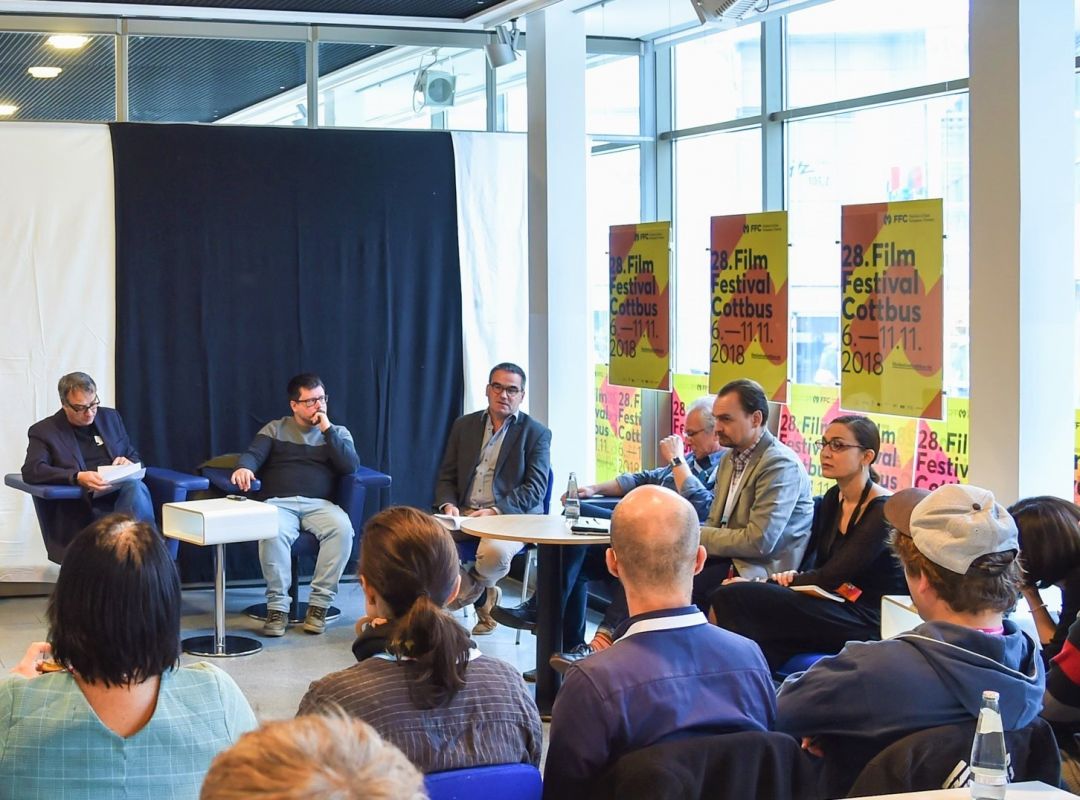During the 28th FilmFestival Cottbus (FFC), representatives of well-known Eastern European film festivals as well as film makers and journalists from the Eastern Partnership countries and Russia met in the context of the network meeting ‘Film festivals between politics and civic values’ to exchange views regarding the situation in their respective countries.
The film festivals meeting at the FFC perceive themselves as social spaces within their respective countries. They inspire dialogue about topics relevant to civil society with their programmes. If nothing else, this makes them a platform for exchange in the context of intercultural and international dialogue between representatives of countries that already have discontinued their readiness to talk on a political level.
However, festivals face a range of economic and political challenges. For instance, the Belarusian culture ministry’s screening ban imposed on two films in the national competition at the renown Minsk International Film Festival Listopad (Belarus) turned into a political issue. In the past year, the Azerbaijan government put political pressure on film festivals that intended to show the Iranian-Armenian film YEVA to such effect that the Istanbul Governor's Office followed their request and prohibited the screening. The argument was that the film by Iranian-born director Anahid Abad, which Armenia had submitted for the 2018 Academy Awards, gave rise to the impression that Nagorno-Karabakh was an Armenian territory. The YEVA incident created a stir in Turkey, but, as was pointed out during the network meeting, was no exception, since Azerbaijan had exerted undue political pressure on various governments, thereby abusing diplomatic channels.
The discussion partners, comprising representatives of the Golden Apricot International Film Festival (Yerevan, Armenia), the Tbilisi International Film Festival (Georgia), the International Documentary Film Festival CRONOGRAF (Chisinau, Moldova), the Moscow International Documentary Film Festival DOKer (Russia), the Odesa International Film Festival (our partner in this project), where the network had a meeting in June, as well as film journalists and film makers from all Eastern Partnership countries (Armenia, Azerbaijan, Belarus, Georgia, the Republic of Moldova, Ukraine) and Russia, emphasised the role of mutual exchange and solidarity in the region’s film scene.
Film was described as the starting point of contemplating the status quo of civil society in the countries in question. Film journalism can in this context pursue one of its most noble tasks and initiate social debate. This is why the network meeting was accompanied by a workshop for young film journalists from the countries in question, in the context of which the participants discussed the socioanalytic function of films, such as Ivan I. Tverdovskiy’s PODBROSY | JUMPMAN (Russia; winner of Special Prize for Best Director at the FFC), which criticises the abuse of official channels for corrupt private purposes, ZAVTRA | TOMORROW (Belarus) about the situation of unemployed older people in the provinces, and MEZOBLEBI | NEIGHBOURS (Georgia) about the social consequences of insubordinate gentrification. Yet the workshop also highlighted the crisis of film reviews that can be detected not only in Eastern Europe, but around the globe. By submitting to economic constraints, the ability of film reviews to engage in social analysis increasingly deteriorates towards becoming nothing more than prolonged marketing.
About the Eastern Partnership Network
Initiated by the FilmFestival Cottbus, the Eastern Partnership Network has been meeting annually since 2017 at the Odesa International Film Festival and the FilmFestival Cottbus for the purpose of mutual exchange.
The event at the FilmFestival Cottbus is supported by the Federal Foreign Office of the Federal Republic of Germany.
About the FilmFestival Cottbus
The 28th FilmFestival Cottbus took place from 6 to 11 November 2018. The FFC showed 220 films competing for prizes totalling over EUR 80,000 and the coveted award sculpture LUBINA (Sorbian: the Lovely) in four competitions and eleven other sections.
More than 22,000 people attended the Festival of East European Cinema in Cottbus in 2018.
The 28th FilmFestival Cottbus received substantial support from the Federal State of Brandenburg, Medienboard Berlin-Brandenburg GmbH, the City of Cottbus, the German Federal Foreign Office and the European Union’s Creative Europe programme.
The 29th FilmFestival Cottbus will take place from 5 to 10 November 2019.
